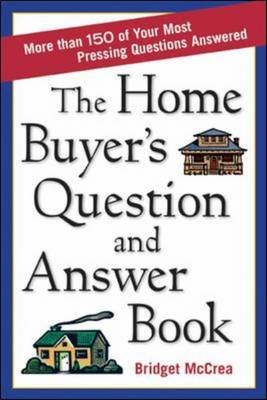
THE HOME BUYER'S QUESTION AND
Amacom (Verlag)
978-0-8144-7236-1 (ISBN)
- Keine Verlagsinformationen verfügbar
- Artikel merken
"If you’re going through the process of buying a home, chances are there are questions you desperately need answers to -- right away! Luckily, The Home Buyer’s Question and Answer Book gives you all the crucial information you need, in an easy-to-flip-to format you can easily consult on the run.
Featuring more than 150 questions, as well as sample loan applications and other valuable resources, the book provides simple answers to fundamental (yet often daunting) questions such as:
* How do I start the homebuying process?
* What if I have blemishes on my credit report?
* What are the different types of real estate agents and how much do they charge?
* How can I ensure an accurate, productive home inspection?
* What can I do to ensure a smooth closing?
Taking you through the entire process, all the way from the decision to buy to post-sale responsibilities, The Home Buyer’s Question and Answer Book is an essential guidebook no first-time home buyer should be without."
McCrea is a former Century 21 real estate agent who now covers real estate as a journalist for a variety of publications, including Realtor Magazine, The Wall Street Journal’s RealEstateJournal.com, and Florida Realtor. She won the Florida Magazine Association’s 2002 Best Feature Award.
"Introduction
PART I: Home Buying 101
Chapter 1: Common Questions about the Homebuying Process
1. Why should I buy a home?
2. How difficult are the financial aspects of purchasing a home?
3. What's the process for buying a new home?
4. What's the market like for first-time home buyers?
5. How can I determine my local market conditions?
6. How do I determine my housing needs?
7. How can emotions affect the homebuying process?
8. What is a REALTOR®?
9. What is the difference between a buyer's agent and a seller's agent?
10. How are REALTORS paid?
11. How do I choose a buyer's agent?
12. Can I find my home on the Internet?
13. How do I start my Internet home search?
14. How long should I plan to live in my new home to make the investment worthwhile?
15. What is a starter home?
16. What should I consider when looking at starter homes?
17. How important is location in the homebuying process?
18. How do I determine whether a neighborhood is right for me?
19. How much home can I afford?
20. What if I can't find the home of my dreams?
Chapter 2: Nailing Down the Finances
21. How much do homes cost?
22. What is a mortgage?
23. How do I determine how long the term of my mortgage should be?
24. Should I get a fixed-rate or adjustable-rate mortgage?
25. What is a prequalification letter?
26. What is a preapproval?
27. What is a loan application?
28. What are lenders looking for?
29. What should I ask my mortgage lender?
30. What is a credit report?
31. What does a low credit score mean?
32. How do I improve my credit score?
33. What are my down payment options?
34. What mortgage programs are available if I don't have the down payment?
35. What should I keep in mind when looking for a subprime loan?
36. What are closing costs?
37. How can I reduce my closing costs?
38. Can I get a mortgage online?
39. What information must I give to obtain a mortgage online?
40. What government resources are available for home buyers?
41. What is a Veterans Administration Loan?
42. What is Fannie Mae's Community Home Buyer's Program?
44. What home buyer programs are available in my region?
45. What is seller financing?
46. Is seller financing a good thing?
47. What is PITI?
Chapter 3: The House Hunt
48. What should I do before searching for a home?
49. How do I start the house-hunting process?
50. What resources can I tap to help with my house hunt?
51. What should I keep track of when looking at homes?
52. What is the Multiple Listing Service?
53. How can I access the MLS?
54. What is a virtual office website (VOW)?
55. Are MLS posting accurate and updated?
56. What are the different types of real estate agents?
57. How do I decide which type of agent to use?
58. What should I look for when previewing homes?
59. What should I ask if the house needs work?
60. What should I look for in a newly constructed home?
61. What is an open house?
62. What is a second showing?
63. What should I look for during the second showing?
64. How long will it take to find my home?
PART II: The Homebuying Process
Chapter 4: Multifamily Housing Options
65. What is a townhouse?
66. What is a condominium?
67. What are the pros and cons of condo ownership?
68. How do I finance a condo or townhouse?
69. How do I insure a condo or townhouse?
70. What is a homeowners association?
71. What is a condo conversion?
72. What is a co-op?
73. Why is co-op ownership unique?
74. What should I consider before purchasing a co-op?
75. How do I finance the purchase of co-op shares?
Chapter 5: Make Your Offer and Negotiate Contract Terms
76. What is an offer?
77. How do I make sure my offer is appropriate?
78. What is earnest money?
79. How much earnest money do I need?
80. What is a counteroffer?
81. How do I make an offer?
82. What does a real estate contract include?
83. What contingencies should be included in an offer?
84. Do I need an attorney?
85. Why set an exact closing date?
86. Does it matter what time of the month I chose to close?
87. How can I come out a winner in the negotiation process?
88. What other items are negotiable?
89. Why would a seller pay my closing costs?
90. What is a seller disclosure?
91. What does ""as is"" mean?
Chapter 6: Put the Home Buying Gears in Motion
92. I've signed a contract. What now?
93. What documents will a lender ask for?
94. What is a home appraisal?
95. How is a home appraised?
96. How can an appraisal affect my ability to obtain a mortgage?
97. The appraisal was very different from the asking price--why?
98. What is a property survey?
99. Do I need a professional home inspector?
100. What's generally included in an inspection report?
101. How can I ensure an accurate, productive home inspection?
102. What is a termite inspection?
103. What is radon?
104. Should I have the house tested for radon?
105. What are lead-based paint hazards?
106. What disclosure requirements exist concerning lead-paint hazards?
107. What is clear title?
108. What does a title report include?
109. What kinds of things can ""cloud"" a title?
110. What is title insurance?
PART III: Sealing the Deal
Chapter 7: Securing Your Mortgage Loan
111. What's the first step in securing a mortgage?
112. How do I choose my loan type?
113. How can I best compare loans?
114. How do I apply for a home loan?
115. What documentation will I need to apply for a loan?
116. What is a mortgage broker?
117. Should I use a mortgage broker?
118. Besides funding, what else does my lender have to provide?
119. What authorizations and approvals will my lender request?
120. Should I sign IRS Form 4506?
121. What factors affect my interest rate?
122. When is an ARM the best choice?
123. What should I know about points?
124. Are there tax advantages to paying points?
125. What does it mean to ""lock in a rate""?
126. Should I lock in a rate?
127. Do I need private mortgage insurance (PMI)?
128. What is a good faith estimate?
129. What is homeowners insurance?
130. How much homeowners insurance do I need?
Chapter 8: The Home Buyer's Legal Rights
131. What is the Fair Housing Act?
132. What should I do if I suspect that I am a victim of discrimination?
133. What is RESPA?
134. What are illegal kickbacks and referral fees?
135. What should I do if I suspect a fee is illegal?
136. What is the Truth in Lending Act?
137. What is the Equal Credit Opportunity Act?
138. What should I do if I suspect a lender has discriminated against me?
139. What rights do I have concerning my mortgage application?
140. What is predatory lending?
141. How can I tell if my lender is using predatory lending tactics?
142. What if there are termites in the home?
143. What if there is radon in the home?
144. What if there is mold in the home?
145. What if a home inspector finds other defects in the home?
146. Do I need a home warranty?
Chapter 9: The Closing Process
147. What happens at the closing table?
148. What should I bring to closing?
149. How does the closing typically unfold?
150. What is a closing statement?
151. What are prorated fees?
152. What fees am I responsible for?
153. What is a walk-through?
154. What should I look for during the walk-through?
155. What can I do to ensure a smooth closing?
156. What if I can't be at the closing?
157. Can the transaction get held up at the closing table?
158. How can a lawyer help ensure a smooth closing?
159. Should I hire an attorney?
160. What should I take away from the closing table?
Chapter 10: Postsale Concerns
161. When is my first house payment due?
162. What will my monthly mortgage loan statements look like?
163. What payment alternatives to lenders offer?
164. Do I need to retain my closing and home-related expenses?
165. How do my mortgage payments affect my taxes?
166. What is a homestead exemption?
167. How do I apply for a homestead exemption?
168. How do property taxes work?
169. How do homeowners insurance payments work?
170. How can I lower my property taxes?
171. What should I do before moving into my new home?
172. How should I pack up my existing possessions for the move?
173. What if I discover a defect that wasn't disclosed to me?
174. What steps should I take if I discover a major defect postsale?
Appendix
Glossary
Resources
Index"
| Erscheint lt. Verlag | 16.2.2005 |
|---|---|
| Verlagsort | New York |
| Sprache | englisch |
| Maße | 150 x 229 mm |
| Gewicht | 400 g |
| Themenwelt | Sachbuch/Ratgeber ► Beruf / Finanzen / Recht / Wirtschaft ► Immobilien / Grunderwerb |
| Sachbuch/Ratgeber ► Freizeit / Hobby ► Heimwerken / Do it yourself | |
| ISBN-10 | 0-8144-7236-2 / 0814472362 |
| ISBN-13 | 978-0-8144-7236-1 / 9780814472361 |
| Zustand | Neuware |
| Haben Sie eine Frage zum Produkt? |
aus dem Bereich


